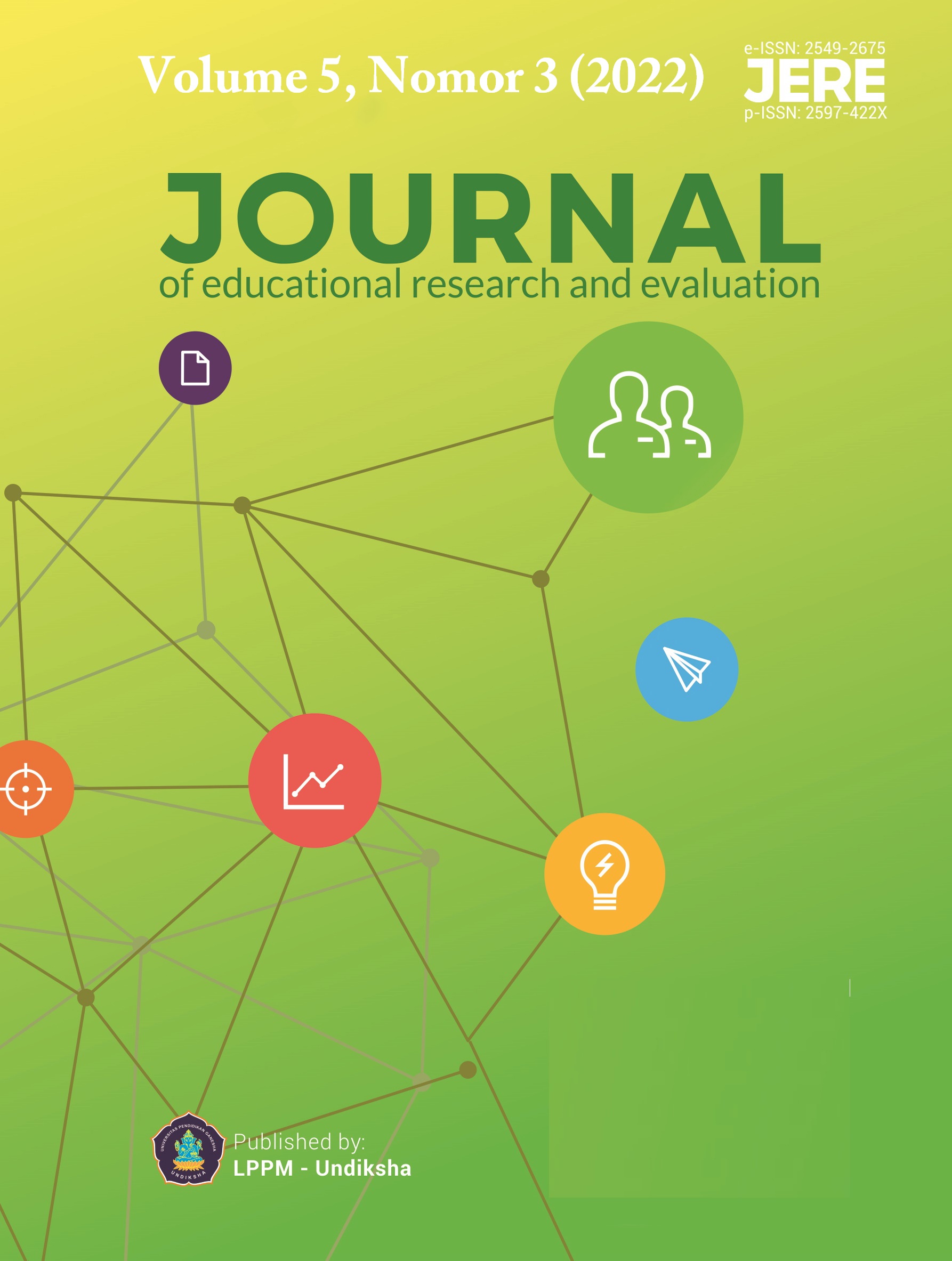Internalization of Economic Education for Subak Farmers
DOI:
https://doi.org/10.23887/jere.v5i3.35254Keywords:
Pendidikan Ekonomi, Kearifan Lokal Bali, Petani SubakAbstract
This study aims to examine the internalization of economic education for subak farmers. This study uses a qualitative approach and the type of phenomenological research. Sources of data in this study are primary sources and secondary sources. The primary sources in the study were headman and subak farmers. Secondary sources in this research are documents related to research. The population in this study was 68 subak. The results of this study are Balinese cultural values consisting of religious values, happiness values, togetherness values, family values, and austerity values that underlie economic behavior of rationality, morality, and altruism. The form of internalization of economic education for subak farmers is economic education learning through (1) exemplary parents to their children in production, consumption, and distribution activities, (2) verbal explanations from parents to their children regarding economic activities, managing finances, economic management strategies, economic themes, (3) Discussion of relevant cases regarding expressing opinions and making decisions, family economic problems, and careful use of money. The obstacles to internalizing economic education for subak farmers are internal and external constraints.
References
Asmin, F. (2018). Budaya dan Pembangunan Ekonomi: Sebuah Kajian terhadap Artikel Chavoshbashi dan Kawan-Kawan. Jurnal Studi Komunikasi (Indonesian Journal of Communications Studies), 2(2). https://doi.org/10.25139/jsk.v2i2.516.
Casson, M., & Wadeson, N. (2018). Emerging market multinationals and internalization theory. International Business Review, 27(6), 1150–1160. https://doi.org/10.1016/j.ibusrev.2018.04.006.
Creswell, J. W., & Poth, C. N. (2018). Qualitative inquiry & research design: Choosing among five approaches (Fourth edition). SAGE.
Dahrif, H. (2019). Menyingkap Akar Kemiskinan Dalam Masyarakat Adat Papua Studi Kasus Masyarakat Adat Dayak (Vol. 280). Deepublish.
Hamid, A. (2016). Metode Internalisasi Nilai-Nilai Ahlak Dalam Pembelajaran Pendidikan Agama Islam Di SMP Negeri 17 Kota Palu. 14(2). http://jurnal.upi.edu/file/06_Metode_Internalisasi_Nilai-Nilai_Akhlak_-_Abdul_Hamid.pdf.
Husain, N. I. A. E., Meisenberg, G., Becker, D., Bakhiet, S. F., Essa, Y. A. S., Lynn, R., & Al Julayghim, F. M. H. (2019). Intelligence, family income and parental education in the Sudan. Intelligence, 77, 101402. https://doi.org/10.1016/j.intell.2019.101402.
Hutagalung, S. (2021). Pendampingan Pastoral Teori dan Praktik.
Jayantiari, I. G. A. M. R., Oka Parwata, A A Gede, & Dharma Laksana, I Gusti Ngurah. (2021). Orientasi Kesejahteraan dalam Pengaturan Subak Sebagai Warisan Budaya Dunia. Kertha Patrika, 43(1), 82–92. https://doi.org/10.24843/KP.2021.v43.i01.p06.
Nawawi, H. I. (2012). Manajemen Pengetahuan (1st ed.). Ghalia Indonesia.
Putra, N. A., Wahyono, H., & Wardoyo, C. (2016). Internalisasi Nilai-Nilai Pendidikan Ekonomi Keluarga Suku Selayar. Jurnal Pendidikan, 1, 2189–2193. http://dx.doi.org/10.17977/jp.v1i11.8069.
Qi, D., & Wu, Y. (2020). Family’s social economic status and child educational outcomes in China: T The mediating effects of parenting practices and children’s learning attitudes. Children and Youth Services Review, 9. https://doi.org/10.1016/j.childyouth.2020.105387.
Rahmatullah, Inanna, & Nurdiana. (2019). Pembelajaran Ekonomi Dan Kearifan Lokal.
Razen, M., Huber, J., Hueber, L., Kirchler, M., & Stefan, M. (2021). Financial literacy, economic preferences, and adolescents’ field behavior. Finance Research Letters, 40, 101728. https://doi.org/10.1016/j.frl.2020.101728.
Rohmah, M. (2019). Internalisasi Nilai-Nilai Pancasila Melalui Pendidikan Ekonomi. 10. https://doi.org/10.30599/utility.v3i2.616.
Safitri Zen, I., Purwanto, Y., Wahyu Titisari, P., Hendrayani, Y., & Bin Syed Ariffin, S. A. I. (2019). Take Stock Bali Island as the Potential of Biosphere Reserve Site. IOP Conference Series: Earth and Environmental Science, 298, 012021. https://doi.org/10.1088/1755-1315/298/1/012021.
Sahlan, A., & Prastyo, A. T. (2012). Desain Pembelajaran Berbasis Pendidikan Karakter. AR-RUZZ MEDIA.
Sartini, N. W. (2017). Makna simbolik bahasa ritual pertanian masyarakat Bali. Jurnal Kajian Bali (Journal of Bali Studies), 7(2), 99. https://doi.org/10.24843/JKB.2017.v07.i02.p06.
Sholihin. (2020, March 10). INTERNALISASI NILAI-NILAI PADA ANAK. https://kalbar.kemenag.go.id/id/opini/internalisasi-nilai-nilai-pada-anak-bagian-3selesai
Suamba, I. K., Tika, I. W., & Krisnandika, A. A. K. (2021). Potential Development of Balinese Water-Control System (Subak) Based Agro-Tourism in the World Cultural Heritage Site of Catur Angga Batukaru. 15, 8. https://doi.org/10.24843/SOCA.2021.v15.i01.p19 211.
Sumiyati, -, Windia, I. W., & Tika, I. W. (2017). Operasional dan pemeliharaan jaringan irigasi subak di Kabupaten Tabanan. Jurnal Kajian Bali (Journal of Bali Studies), 7(1), 121. https://doi.org/10.24843/JKB.2017.v07.i01.p08.
Suratno, Narmaditya, B. S., & Wibowo, A. (2021). Family economic education, peer groups and students’ entrepreneurial intention: The mediating role of economic literacy. Heliyon, 7(4), e06692. https://doi.org/10.1016/j.heliyon.2021.e06692.
Tracy, S. J. (2020). Qualitative Research Methods.
Varvarigos, D. (2020). Cultural transmission, education-promoting attitudes, and economic development. Review of Economic Dynamics, 37, 173–194. https://doi.org/10.1016/j.red.2019.11.005.
Wahyu, S., Rizal, F., & Nurhasan Syah. (2021). Teacher Performance Analysis in the Learning Process. 5, 67–75. https://doi.org/10.23887/jere.v5i2.31597.
Wigena, I. B. W. (2019). Subak Kini dan Nanti: Sistem Subak dan Relevansinya Bagi Pendidikan: Vol. 310.8 (Pertama). Anggota IKAPI.
Yasa, I. M. R. (2018). Rencana Operasional Rencana Strategis (Renstra) Balai Pengkajian Teknologi Pertanian Bali 2015-2019. Balai Pengkajian Teknologi Pertanian Bali.
Zhi, K., Chen, Y., & Huang, J. (2020). Children’s self-control and family savings for education: An empirical examination from China. Children and Youth Services Review, 119, 105575. https://doi.org/10.1016/j.childyouth.2020.105575.
Downloads
Published
How to Cite
Issue
Section
License
Authors who publish with the Journal of Evaluation and Research in Education (JERE) agree to the following terms:
- Authors retain copyright and grant the journal the right of first publication with the work simultaneously licensed under a Creative Commons Attribution License (CC BY-SA 4.0) that allows others to share the work with an acknowledgment of the work's authorship and initial publication in this journal.
- Authors are able to enter into separate, additional contractual arrangements for the non-exclusive distribution of the journal's published version of the work (e.g., post it to an institutional repository or publish it in a book), with an acknowledgment of its initial publication in this journal.
- Authors are permitted and encouraged to post their work online (e.g., in institutional repositories or on their website) prior to and during the submission process, as it can lead to productive exchanges, as well as earlier and greater citation of published work. (See The Effect of Open Access)











